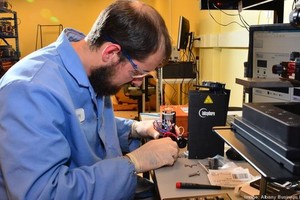
Crystal IS has started selling a UV LED chip that kills bacteria in water for the pharmaceutical, semiconductor and power generation industries. The device can also track climate Change.
The disinfecting chip, called the Optan SMD, prevents biofilm from forming. Biofilm is a thin film of bacteria on a surface. It can grow on everything from catheters and contact lenses to pipes and instruments used in the pharmaceutical, semiconductor and power generation industries.

Customers could include people who are making sensors that go in the ocean or river water, have cameras for underwater imaging, have industrial sensors in equipment used for water flow or have bioreactors to design. People who supply the pharmaceutical industry as a way to increase productivity could also use the chip.
"Preventing contamination is important and biofilm tends to form by external connection," said Hari Venugopalan, the director of global product management at Crystal IS. Venugopalan said the chip's economic impact on water instruments could be as much as USD 2 billion.
The ultraviolet light technology developer manufacturers LEDs in Green Island, New York. Crystal IS designs and manufactures 0.8 millimeter ultraviolet LED chips used to sense and disinfect water, air and surfaces. Crystal IS transitioned from a research and development company to a manufacturer last year. Its first device, called Optan, uses ultraviolet light to monitor things like oil and proteins in water.
Venugopalan said the new device — Optan SMD — could have 10 times the market potential of the first product.
He said the cost to industries from biofouling and corrosion is more than $200 billion in the United States.
Optan SMD is an environmentally-friendly version of the current ways available to prevent biofilm. Traditional methods include copper paint, which is not as effective; mechanical wipers, which have a high failure rate and use a lot of power; and the toxic chemical Tributyltin.
"People have known of the effect of UV light for a long time, but the only source of UV light before was in mercury lamps, and mercury has disadvantages," Venugopalan said.
Crystal IS is a wholly-owned subsidiary of Asahi Kasei, a global manufacturer of chemicals and fibers for the housing, construction, electronics and healthcare industries. Crystal IS was founded in 1997 by professors from Rensselaer Polytechnic Institute.
Source:
Chelsea Diana
